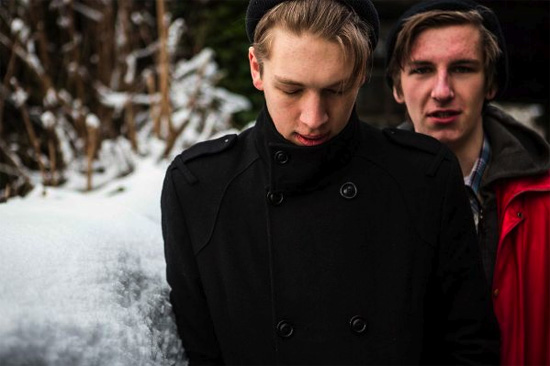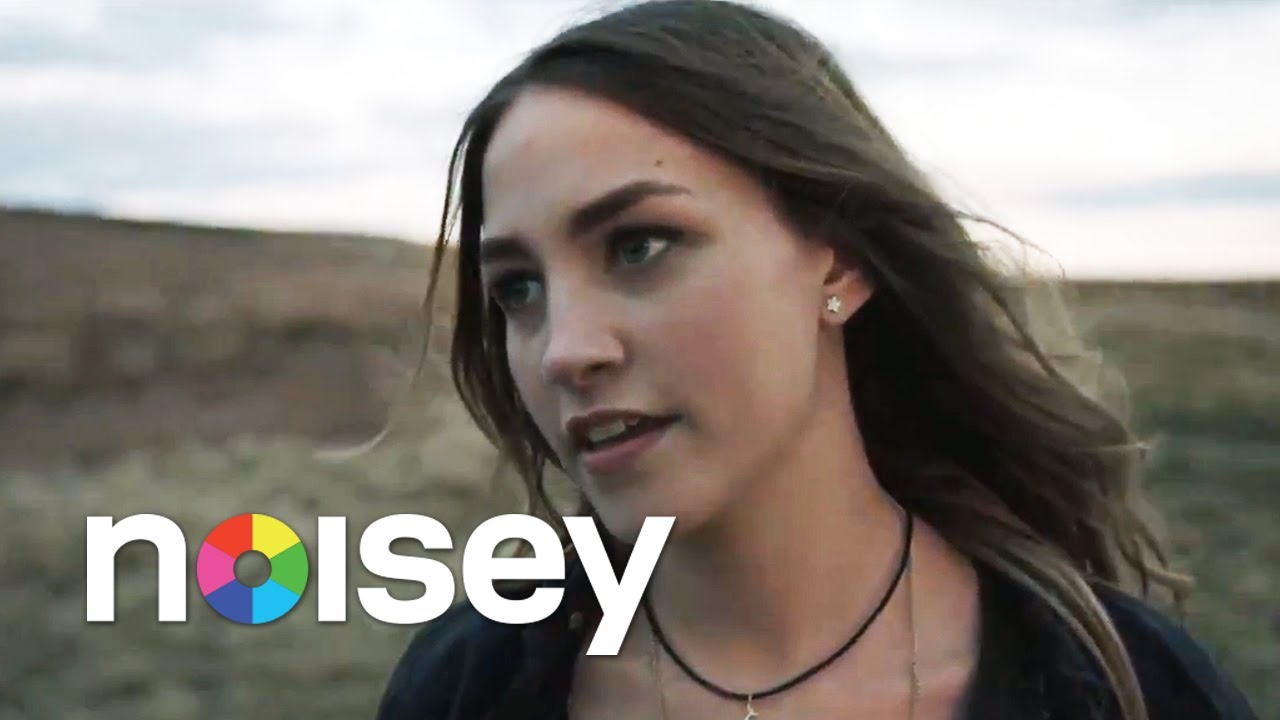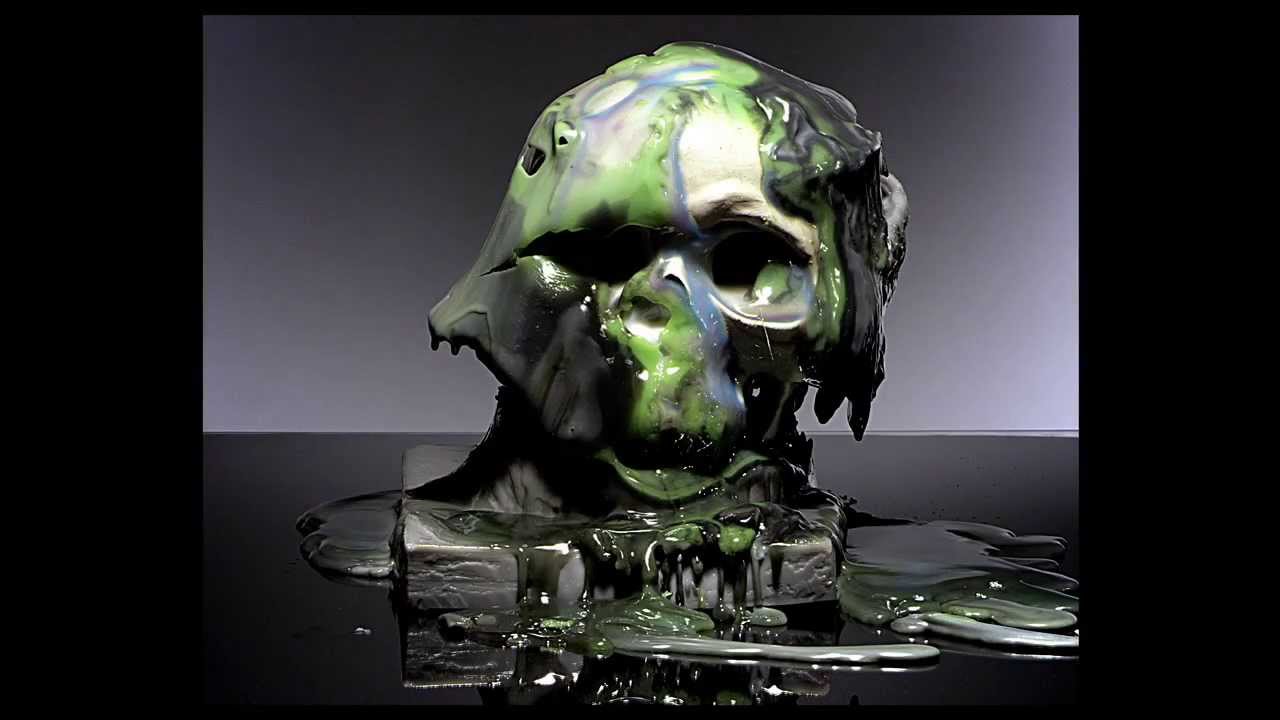The dead-end boredom of living in a small town has been an inspiration to many musicians, who either escape at the earliest opportunity and rail against it from afar, or remain trapped, kicking against the monotony from within. When talking about Aberdeen, the town 100 miles from Seattle where Kurt Cobain grew up, he said, "Aberdeen was such a small town. I was very isolated… and I became antisocial. I started to understand the reality of my surroundings, which didn’t have a lot to offer." But had Cobain grown up in a thriving metropolis like New York, it is unlikely he would have written such incredibly raw and truthful songs. Where you’re from informs where you’re at…
Eoin Loveless of Drenge is the latest artist to use growing up in butt-fuck nowhere as his muse. Hailing first from Hope and later moving to Castleton, small picturesque villages in the Peak District that are easy on the eye but where there is nothing to distract the youth apart from roadkill and dreams of getting out, Eoin was lucky that he had younger brother Rory for company. And he could channel his frustration into playing the guitar and writing songs like the bruised punk-blues of ‘Backwaters’ (described by Eoin as "a folk song played on a distorted guitar"), a song that perfectly encapsulates the nihilism that can engulf you when you are isolated by location. Those rolling limestone hills may be paradise for ramblers and tourists, but for teenagers they are a trap. The brutal reality of rural life can turn the embryonic mind to morbid thoughts. "I’d never seen blood and milk mixed so divine," Eoin mournfully intones on ‘Backwaters’, like a youthful Mozza after witnessing some farm-based atrocity, "I’d never seen such beauty so maligned." The accompanying video dispenses with such subtle turns of phrase, as a group of youths sup vodka and strong lager, nick a car, turn donuts in a field and then smash the car up, before rounding things off by brawling in front of a huge bonfire. You make your own fun in the countryside.
But over the phone, Eoin is cheerful and considered, not the sullen, aggro Kevin The Teenager you might expect from listening to confrontational songs like ‘I Want To Break You In Half’. The good mood is warranted – the album he has created with his talented younger brother bashing the skins is a triumph. Anybody thinking that there is nothing left sonically to be wrought from the two-piece dynamic will be surprised by the pulsating set of songs on Drenge’s debut. Their bone-shaking punk-blues isn’t breaking any new ground, but fans of Nirvana, The White Stripes and Jeff the Brotherhood will appreciate the duo’s melodious approach to ramshackle garage rock. Eoin’s voice has real depth. Like Cobain he can do primal howls and soulful bellows, while Rory’s jazz background adds musicality to the drumming, with intricate rolls and fills embellishing the more rudimentary tub-thumping.
In their nascent career, the band has already been consumed by the perfect publicity storm that came from the patronage of the Labour MP Tom Watson, who resigned his position as the Labour Party’s General Election co-ordinator by name checking Drenge as a band Ed Miliband should check out. They are appreciative of the attention it has brought them, but anxious that it doesn’t define them. So we skirt the issue and instead discuss the savage beauty of rural living, brotherly love and the modern curse of the smartphone-wielding gig goer.
I read an early interview with you when you said that you weren’t "interested in releasing something as gravitas as an album." What changed?
Eoin Loveless: We were really scared about doing an album in the first place because we thought it meant something that it just doesn’t mean now that we’ve done it. This record was compiled over a few sessions that spanned two years. So the album came together by just putting those together in a logical order.
It hangs together really well.
EL: I listened to the test pressing the other day and I was shocked by how it fits together. We were lucky that the songs sat together so well.
I grew up in a small town, so I can really relate to ‘Backwaters’. It perfectly captures that nothingness that can engulf you when you live in the middle of nowhere. What was it like for you and Rory growing up in a rural backwater?
EL: We lived in a small village called Hope. I thought my parents were trying to ruin my life – my last name is Loveless and I was living in Hope. When I used to go to Sheffield there were lots of stupid jokes. People thought I was living this comedy life. It was an area called the Hope Valley, right in the middle of nowhere. It’s about an hour’s bus ride into Sheffield. We were surrounded on all sides by hills and trees… this beautiful landscape, but really it’s a bit of a trap.
It’s hard to appreciate that when you’re a kid – maybe as you get older you can really enjoy a pretty landscape, but when you’re young you want stuff to do rather than stuff to look at. Did you dream of getting out?
EL: Well, yeah, but we still live with our parents [laughs] in Castleton now, but we’re never home.
But where you’re from totally informs where you’re at – so without Hope and Castleton, there’d be no Drenge…
EL: Yeah, exactly.
The overriding mood of the album is of frustration and anger. You’re definitely kicking against something: society, parents, the school hardnut or the girl who didn’t fancy you. Is that what it was like for you growing up?
EL: Well, that was definitely the attitude of the music that really got to us and summed up exactly how we felt. I like pop songs and I like loud guitar songs, so if we were going to make music that was what we wanted to do.
There’s a lot of mentions in your songs of being beaten up, kicked in the guts, losing teeth – the imagery is very violent. Were you getting into lots of scraps growing up?
EL: It’s more like an observation. Or maybe some kind of fantasy wish fulfillment where you step up to the plate and deal with the bully or whatever. I’m not a violent guy.
But the imagery is also very raw – skin peeling off and exposed flesh and skulls. You’re obviously trawling your imagination, but there is a real violence in the wilderness and rural living. There’s a beautiful line in ‘Backwaters’ about blood and milk mixing…
EL: You see a lot of stuff in the countryside that is disturbing. You see a lot of roadkill that you just have to get used to. You build up a strong stomach for blood and death because it’s everywhere. You hear screaming from animals on farms – it’s not picturesque or beautiful place to live by any means.
Have you and Rory always had a close relationship or were there points when you didn’t get along?
EL: Yeah, we’re pretty close. We don’t look that similar to each other, so we can distance ourselves from each other. It’s quite easy to forget about being brothers. But because of where we lived we had to spend lots of time hanging out… so, yeah. He’s my brother, but he’s also a really good mate.
Has the dynamic of your relationship changed since you formed a band?
EL: We just carry on really. We’re spending a lot of time together – probably the most since before we started school. I dunno if we’re reverting back to being toddlers. He’s an easy guy to get along with.
There’s a very specific sonic dynamic to being in a two-piece – just the guitar and drums. Do you ever think about expanding?
EL: Yeah, that’s something that we talk about. But at the moment what we are is a two-piece and this album is just us as a two-piece. But I don’t want people to fall in love with that, and when we say goodbye to that, think that we’re betraying what we are. But I think we need to try and do everything we can do as a two-piece before it starts to get boring and then start to think about… I mean, it’ll just be when we start to write parts for songs that need another member in the band.
Rory used to play drums in the school jazz band, right? He’s a very musical drummer.
EL: Yeah, he’s amazing at keeping time, which is hugely important as a drummer, and lots of people seem to forget that as soon as they pick up a pair of sticks. He treats it as an instrument, and when you talk to him about it, he really cares about each fill and each part. He’s never happy. He’ll just keep breaking it down. He’s a proper artist when it comes to the drums.
At the end of ‘Let’s Pretend’ he turns into Jimmy Chamberlin [from Smashing Pumpkins]. It’s a real drumming tour de force.
EL: The second half of that song is the best thing on the album and I don’t do anything on it. It’s just him nailing every single fill and every beat is amazing. I love that bit.
What music did you grow up listening to?
EL: Nothing too bizarre or leftfield. Our parents had a tape of The Beatles that had a misplaced Kinks song on it. And I was really annoyed when I found out it was The Kinks because I felt like I should have been able to tell. And The White Stripes. We just really liked guitar songs and that turned into listening to Wheatus and Blink 182.
That stands out in what you do. They’re pop songs really – melodic and tuneful, but just played really loud and distorted. You’ve got a knack for writing a good hook.
EL: That’s really important. I want to write songs that will inspire kids to pick up the guitar. It’s the easiest way to express what you go through as a teenager and growing up. It won’t go away until we’re totally overrun by electronic music, and I don’t think that’s as impending as people make out.
I’m sure you’re bored of talking about (Labour MP) Tom Watson’s patronage of the band, so I wanted to try and move it on a bit. Politicians are so desperate to align themselves with bands, but bands seem to be going the other way – they don’t want to be associated with any political parties. Is it not very cool to be political as a band? Is that something you’re aware of in your peer group?
EL: It is cool for your music to be political and to be political through your music, but that shouldn’t mean Westminster. I think the world of politicians is something that as a musician you feel very removed from. But it doesn’t mean that you shouldn’t write songs that stir up political feelings. The best political records are the ones that properly dig at politicians and make you feel strongly about a certain topic and about the world. It shouldn’t be about MPs. I think he (Tom Watson) was using it to imply that other members of parliament should go to more gigs. It’s fine for all the politicians to turn up at the Wimbledon final or sporting events to support a British sportsperson or go to the football. But when it comes to culture, politicians take such a back seat – they’re not interested. There’s no funding for it.
You’ve talked about wanting a more visceral connection from the audience to your music. I know you’re not inciting violence, but audiences are more benign these days. The first proper gig I went to was a Ride gig in Salisbury in 1990 and even there I got pushed to the floor and trampled on. There were lots of fights. There were no smartphones or chatting at the bar. It was full on. So you want your audience to be more engaged, even if it does mean the odd punch up?
EL: I don’t want anyone to get hurt, but I just find it weird when we’re playing really in your face music. I’m not trying to provoke a reaction, but our music requires it for it to work. People won’t walk away from a Drenge gig if everyone was on their phones saying, "That was a great gig." The great gigs that you go to are ones where everyone is so focused on the art. It’s so weird – mobiles seem to be this ultimate life that you can just dip into whenever you want. I saw a photo of when the new Pope was announced and everyone was taking photos on their camera phones and tablets. Then I saw a photo from eight years previous when that Pope had been announced, and there was one person with a camera. iPhones and smartphones have totally changed the world. It’s the same with alcohol. It plays such an important part in the music industry, but what it also does is it takes up people’s arms and stops them from dancing and being close to the band because they’re worried that their drink will get knocked over. Or they just drink too much and are a nightmare and ruin everyone’s night. Alcohol and phones should be banned at gigs.
You’ve been recording with Matt from Hookworms recently, at his Suburban Home studio. How’s that been?
EL: We needed a new B-side for the next single – whatever that is – and when the album comes out that will be everything that we’ve recorded used. I’d feel really exposed if we didn’t have anything else kept back. Matt’s a really talented and special guy. He’s been really helpful – always coming up with new ideas and styles.
Has he been trying to get you to use the Space Echo?
EL: [Laughing] Yeah, a lot of Space Echo. He brought another one when we were there. Everyone should have a look at a Space Echo with the lid lifted off when it’s running. It’s one of the most hypnotic things I’ve ever seen. I can see why people fall so madly in love with them.
Drenge’s self-titled debut album is out now on Infectious




